Unit 1 Playing Sports.Topic 2 Section A仁爱版八年级英语上册课件(共32张PPT,内嵌音频和视频)
文档属性
| 名称 | Unit 1 Playing Sports.Topic 2 Section A仁爱版八年级英语上册课件(共32张PPT,内嵌音频和视频) |

|
|
| 格式 | pptx | ||
| 文件大小 | 30.9MB | ||
| 资源类型 | 教案 | ||
| 版本资源 | 仁爱科普版 | ||
| 科目 | 英语 | ||
| 更新时间 | 2023-08-22 22:04:11 | ||
图片预览

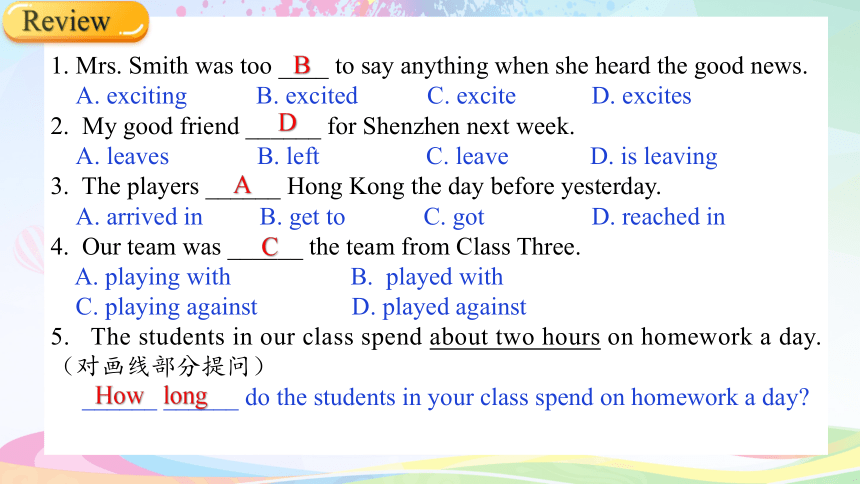
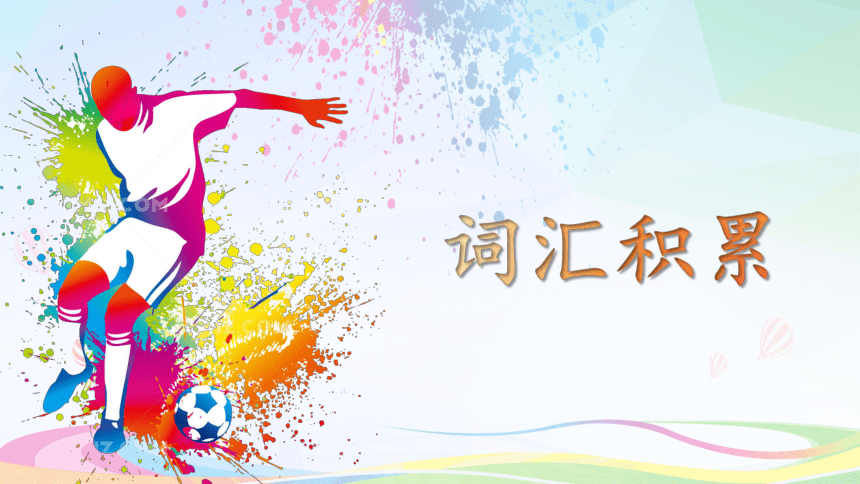
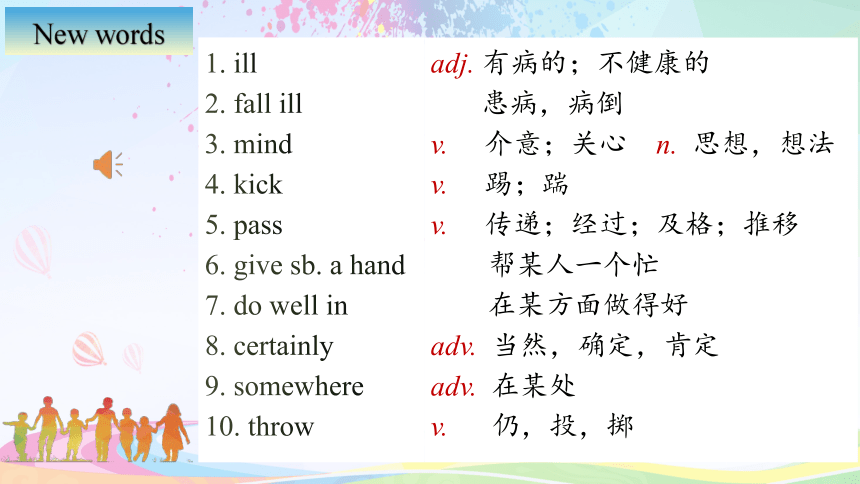
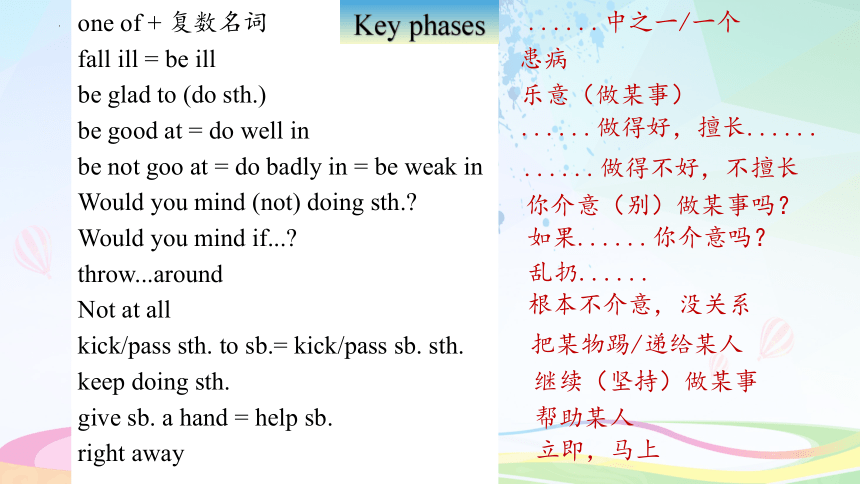
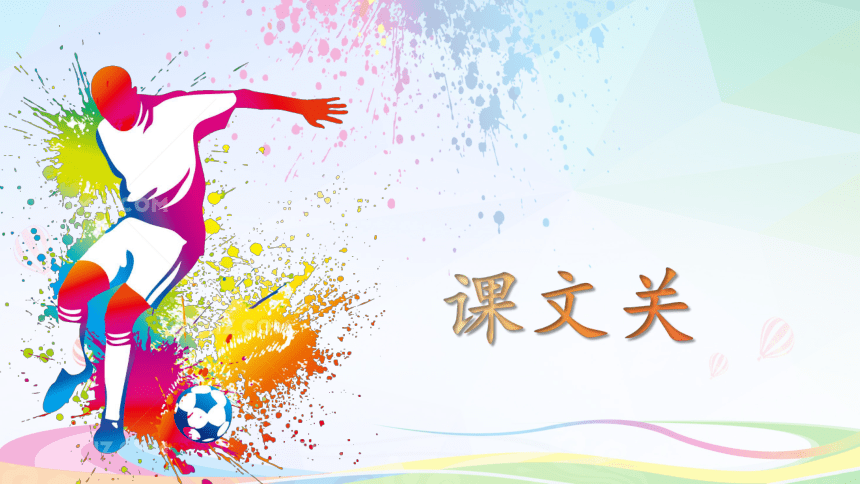
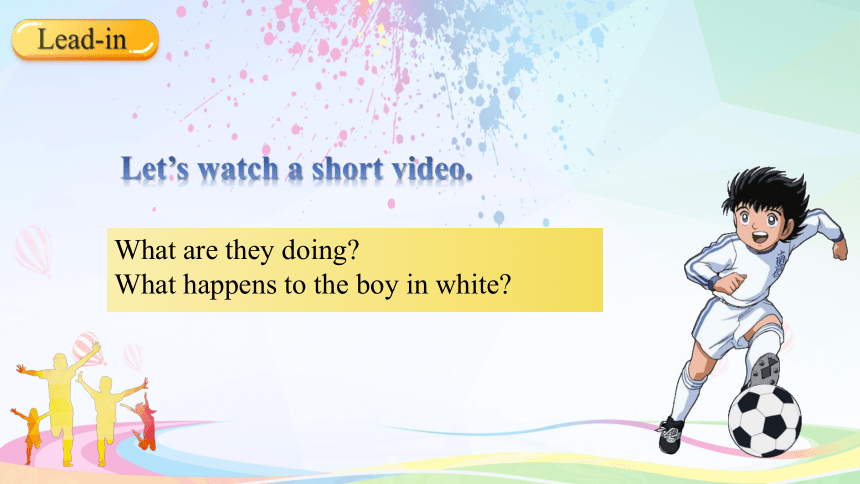
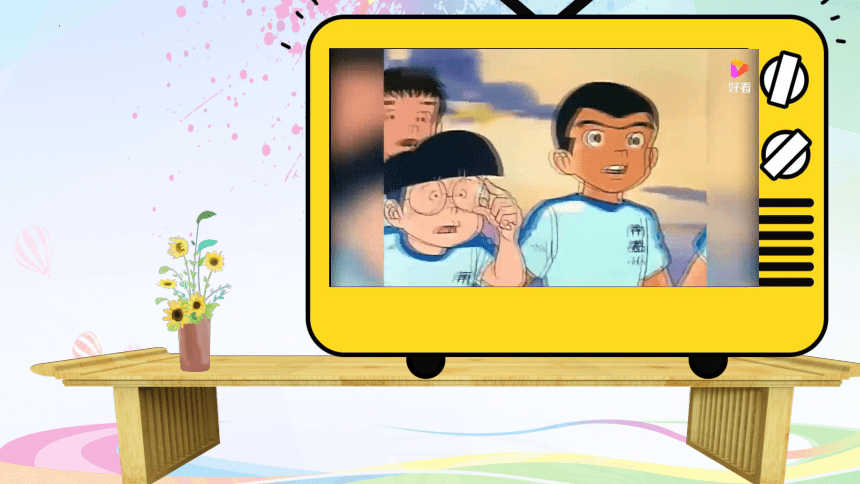
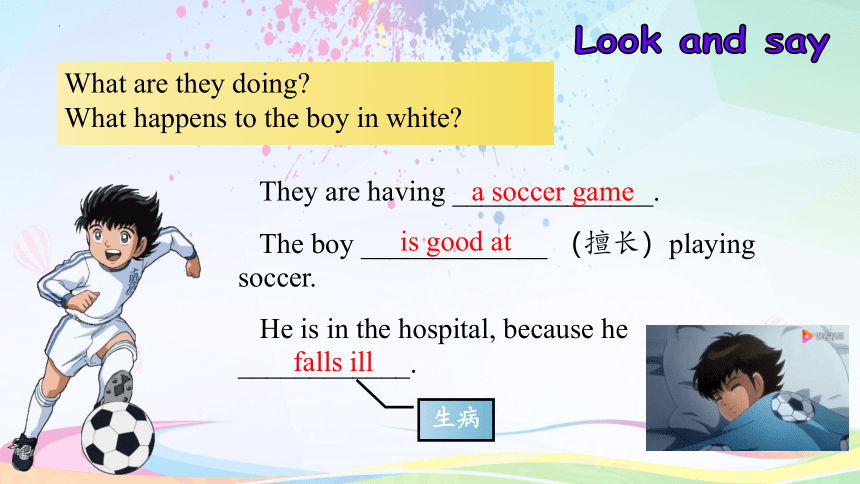

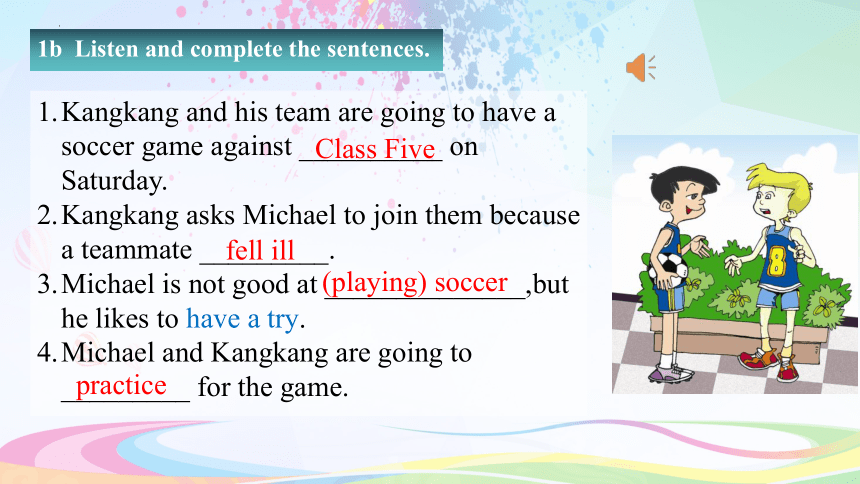
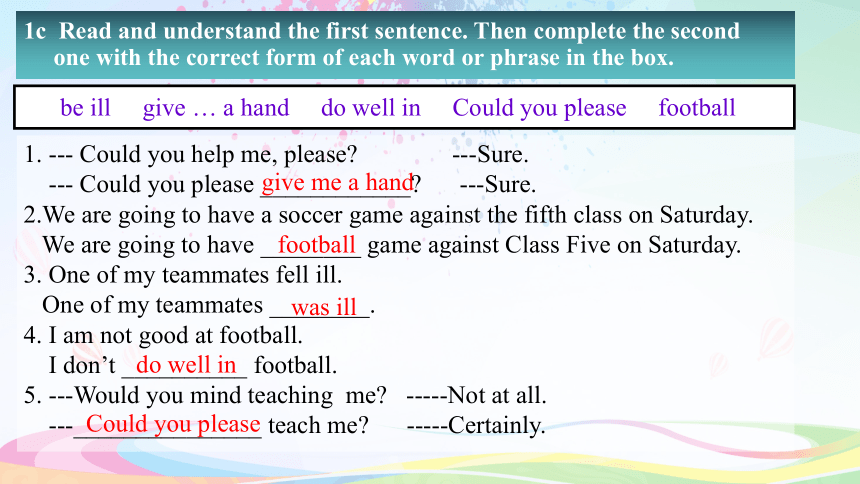
文档简介
(共32张PPT)
Unit 1 Playing Sports
Topic 2 I’ll kick you the ball again.
Section A
1. Mrs. Smith was too ____ to say anything when she heard the good news.
A. exciting B. excited C. excite D. excites
2. My good friend ______ for Shenzhen next week.
A. leaves B. left C. leave D. is leaving
3. The players ______ Hong Kong the day before yesterday.
A. arrived in B. get to C. got D. reached in
4. Our team was ______ the team from Class Three.
A. playing with B. played with
C. playing against D. played against
5. The students in our class spend about two hours on homework a day. (对画线部分提问)
______ ______ do the students in your class spend on homework a day
B
D
A
C
How long
Review
词汇积累
1. ill
2. fall ill
3. mind
4. kick
5. pass
6. give sb. a hand
7. do well in
8. certainly
9. somewhere
10. throw
adj. 有病的;不健康的
患病,病倒
v. 介意;关心 n. 思想,想法
v. 踢;踹
v. 传递;经过;及格;推移
帮某人一个忙
在某方面做得好
adv. 当然,确定,肯定
adv. 在某处
v. 仍,投,掷
New words
one of + 复数名词
fall ill = be ill
be glad to (do sth.)
be good at = do well in
be not goo at = do badly in = be weak in
Would you mind (not) doing sth.
Would you mind if...
throw...around
Not at all
kick/pass sth. to sb.= kick/pass sb. sth.
keep doing sth.
give sb. a hand = help sb.
right away
......中之一/一个
乐意(做某事)
......做得好,擅长......
......做得不好,不擅长
你介意(别)做某事吗?
如果......你介意吗?
乱扔......
根本不介意,没关系
把某物踢/递给某人
患病
继续(坚持)做某事
帮助某人
立即,马上
Key phases
课文关
Let’s watch a short video.
Lead-in
What are they doing
What happens to the boy in white
Look and say
They are having ______________.
The boy _____________ (擅长)playing soccer.
He is in the hospital, because he ____________.
falls ill
生病
What are they doing
What happens to the boy in white
a soccer game
is good at
Listen and answer the following questions.
Which class are they going to play against
What’s wrong with Kangkang’s teammate
3. Would Kangkang mind teaching him
They are going to play against Class Five.
He fell ill.
Not at all.
1b Listen and complete the sentences.
Kangkang and his team are going to have a soccer game against __________ on Saturday.
Kangkang asks Michael to join them because a teammate _________.
Michael is not good at ______________,but he likes to have a try.
Michael and Kangkang are going to _________ for the game.
Class Five
fell ill
(playing) soccer
practice
1c Read and understand the first sentence. Then complete the second
one with the correct form of each word or phrase in the box.
be ill give … a hand do well in Could you please football
1. --- Could you help me, please ---Sure.
--- Could you please ____________ ---Sure.
2.We are going to have a soccer game against the fifth class on Saturday.
We are going to have ________ game against Class Five on Saturday.
3. One of my teammates fell ill.
One of my teammates ________.
4. I am not good at football.
I don’t __________ football.
5. ---Would you mind teaching me -----Not at all.
---_______________ teach me -----Certainly.
give me a hand
football
was ill
do well in
Could you please
Suppose you will have a basketball game against Class Six this Friday afternoon. But your teammate Li Ming is ill. Make a similar conversation with your partner according to 1a.
Pair work
Watch the flash
Kangkang: Michael, could you help me, please
Michael: Sure. What is it
Kangkang: We are going to have a soccer game against Class Five on
Saturday. But one of my teammates fell ill. Will you join us
Michael: I’d be glad to. But I am not very good at it.
Would you mind teaching me
Kangkang: Not at all. You can do it! Let’s go and practice.
(Kangkang and Michael are practicing on the playground.)
Kangkang: Michael, I kick the ball to you. And you pass me the ball like this.
Michael: Sorry, I missed it.
Kangkang: Never mind. Keep trying. I’ll kick you the ball again.
Michael: OK.
Example:
I kick the all to you. I kick you the ball.
这是含有双宾语的句子。
kick sb. sth.= kick sth. to sb.
类似用法的动词有:pass, give, bring, take…
在1a中找出相似结构的句子:
I kick the ball to you.
= I kick you the ball.
You pass me the ball like this.
= You pass the ball to me like this.
1d Read 1a and underline the sentences with the direct and indirect object
structure. Then follow the example to rewrite them.
1. 请把书包拿给我。
Please bring me the schoolbag.
=Please bring the schoolbag to me.
2. 不要把钱给他。
Don’t give the money to him.
=Don’t give him the money.
Practice
总结:及物动词+直宾+to/for+间宾
及物动词+间宾+直宾
2 A. Listen to the conversations and number the pictures.
1
2
3
4
B. Listen again and fill in the blanks.
A: Would you mind ___________________
B: Of course not. I’ll do it right away.
A: Would you mind if I try it again
B: _______________. Please do.
A: _______________ putting your bike here
B: Sorry. I’ll put it somewhere else.
A: Would you mind not throwing bottles around
B: ___________________. I won’t do it again.
passing me the ball
Certainly not
Do you mind not
I’m sorry about that
2
1
3
4
语法关
Could you give him a hand
Sure! What is it
give sb. a hand 帮助某人
back
1. Could you help me, please 你能帮助我吗?
Could you do sth., please 可以换种方式表达为Could you please do sth.
句中的could是由can变来的,既不表时态,也不表能力,更多的是表示
“请求别人做某事”。
其肯定回答是:Sure./Of course./Certainly.
其否定回答是:Sorry./I’m sorry, I can’t.
及时练习1:
1. —Could you tell me how to get to the bank, please
— _______ .
A. No, I couldn’t B. Don’t ask me C. Thank you
D. Certainly. You can turn left at the first crossing.
2. —Could you come, please I want some help. — _______ .
A. Yes, I could B. You’re welcome
C. Sure. I’m coming now D. That’s right
back
D
C
Would you mind teaching him English
Not at all.
Would you mind doing sth? 你介意做某事吗?
back
2. Would you mind teaching me 你介意教教我吗?
Would/Do you mind... 常用来表示委婉的请求或表示希望得到对方的许可。运用好该句型应该注意以下四点:
(1)Would/Do you mind 后接doing sth.时,表示希望对方做某事。其中would比do语气更委婉,熟人之间说话时用do 代替would。
eg. Would/Do you mind looking after my little sister
请你帮我照看一下我的妹妹,好吗?
(2)Would/Do you mind 后接one’s doing sth.时,用来请求或询问对方是否介意自己或别人做某事,其中形容词性物主代词one’s在口语中可用代词宾格担当动名词的逻辑主语。
eg. Would/Do you mind my/me asking you a question
我请教你一个问题好吗?
back
2. Would you mind teaching me 你介意教教我吗?
Would/Do you mind... 常用来表示委婉的请求或表示希望得到对方的许可。运用好该句型应该注意以下四点:
(3)Would/Do you mind 后接if从句时,也是询问对方是否介意某人做某事。
eg. Would you mind if I sit here = Would you mind my sitting here
你介意我坐这里吗?
(4)关于该句型的回答:
表示“不介意”或“同意”时,常用否定形式。
eg. No, of course not./No, certainly not./No, not at all.
/ No, I don’t mind./No, do it please.
表示“介意”或“不同意”时,则常用较委婉的方式加以拒绝。
eg. I’m sorry but I do./Sorry, you’d better not./I’m afraid you can’t.
/I wish you wouldn’t.../Sorry, you can’t.
back
注:到目前为止所学的表示建议的句型主要有:
Can/Could/Will/Would you (please) do 请你......., 好吗?
Let’s (do)... 让我们......
What/How about (doing)... ......怎么样?
Why not (do)... 何不......?
Would you like (to do)... 你愿意......吗?
Would you mind doing... 你介意......吗?
及时练习2:
1. —Could you mind cooking a bowl of noodles for me
— _______. I have to go to work now.
A. Not at all B. Never mind C. No, please D. Sorry, I can’t.
2. —Would you mind _____ my pet dog while I’m away —Sure, no problem.
A. take care of B. taking care
C. to take care of D. taking care of
D
D
back
3. Sorry, I missed it. 抱歉,我错过了它。(没有接住)
miss 的用法:
(1)miss用作及物动词,意为“怀念,想念;惦记”。
eg. I miss my parents when I am at school.
我在校时很想父母。
(2)miss用作及物或不及物动词,后可接宾语(名词、代词或doing形式),也可不接宾语,意为“错过,未看到/遇上/打中”。
eg. We missed the train.
我们错过了火车。
注:missing = lost (adj.) 丢失的
back
4. Keep trying. 继续努力。
注意:keep doing 和keep on doing的用法区别:
(1)keep doing “持续做某事”,强调状态的继续,常与表示延续动作的动词连用。
eg. He kept talking/eating/smiling/walking/running.
他一直在说/吃/笑/走/跑(没停过)。
(2)keep on doing表示动作反复,强调动作与动作之间有间隔,常与表示短暂动作的动词连用,意为“坚持做某事”(克服困难继续坚持)。
eg. We must keep on studying hard in the coming new year.
来年我们将继续努力学习。
He kept on raising her hand. 他反复举手。
back
5. I’ll put it somewhere else. 我将把它放在某人其他的地方。
“else” 意为“别的,另外的”,在使用时常位于疑问词、不定代词等的后面。
eg. What else would you like
你还想要别的什么吗?
We went to the theatre and nowhere else.
我们到剧院去了,其他什么地方也没去。
及时练习3:
1. _______ _______ will take part in the sports meeting
还有谁要去参加运动会?
2. Would you like _________ ________ to eat
你还有吃点别的什么吗?
Who else
something else
back
We can:
We learn:
Phases:
fall ill, be ill, do well in, be good at, would you mind, give me a hand.
2. Sentences with direct and indirect object structure.
Make requests and responses
Summary
Homework
Read 1a.
Memorize the useful expressions and key sentences which we learn today.
Finish Section A in your workbook.
Preview Section B.
Thank you!
Unit 1 Playing Sports
Topic 2 I’ll kick you the ball again.
Section A
1. Mrs. Smith was too ____ to say anything when she heard the good news.
A. exciting B. excited C. excite D. excites
2. My good friend ______ for Shenzhen next week.
A. leaves B. left C. leave D. is leaving
3. The players ______ Hong Kong the day before yesterday.
A. arrived in B. get to C. got D. reached in
4. Our team was ______ the team from Class Three.
A. playing with B. played with
C. playing against D. played against
5. The students in our class spend about two hours on homework a day. (对画线部分提问)
______ ______ do the students in your class spend on homework a day
B
D
A
C
How long
Review
词汇积累
1. ill
2. fall ill
3. mind
4. kick
5. pass
6. give sb. a hand
7. do well in
8. certainly
9. somewhere
10. throw
adj. 有病的;不健康的
患病,病倒
v. 介意;关心 n. 思想,想法
v. 踢;踹
v. 传递;经过;及格;推移
帮某人一个忙
在某方面做得好
adv. 当然,确定,肯定
adv. 在某处
v. 仍,投,掷
New words
one of + 复数名词
fall ill = be ill
be glad to (do sth.)
be good at = do well in
be not goo at = do badly in = be weak in
Would you mind (not) doing sth.
Would you mind if...
throw...around
Not at all
kick/pass sth. to sb.= kick/pass sb. sth.
keep doing sth.
give sb. a hand = help sb.
right away
......中之一/一个
乐意(做某事)
......做得好,擅长......
......做得不好,不擅长
你介意(别)做某事吗?
如果......你介意吗?
乱扔......
根本不介意,没关系
把某物踢/递给某人
患病
继续(坚持)做某事
帮助某人
立即,马上
Key phases
课文关
Let’s watch a short video.
Lead-in
What are they doing
What happens to the boy in white
Look and say
They are having ______________.
The boy _____________ (擅长)playing soccer.
He is in the hospital, because he ____________.
falls ill
生病
What are they doing
What happens to the boy in white
a soccer game
is good at
Listen and answer the following questions.
Which class are they going to play against
What’s wrong with Kangkang’s teammate
3. Would Kangkang mind teaching him
They are going to play against Class Five.
He fell ill.
Not at all.
1b Listen and complete the sentences.
Kangkang and his team are going to have a soccer game against __________ on Saturday.
Kangkang asks Michael to join them because a teammate _________.
Michael is not good at ______________,but he likes to have a try.
Michael and Kangkang are going to _________ for the game.
Class Five
fell ill
(playing) soccer
practice
1c Read and understand the first sentence. Then complete the second
one with the correct form of each word or phrase in the box.
be ill give … a hand do well in Could you please football
1. --- Could you help me, please ---Sure.
--- Could you please ____________ ---Sure.
2.We are going to have a soccer game against the fifth class on Saturday.
We are going to have ________ game against Class Five on Saturday.
3. One of my teammates fell ill.
One of my teammates ________.
4. I am not good at football.
I don’t __________ football.
5. ---Would you mind teaching me -----Not at all.
---_______________ teach me -----Certainly.
give me a hand
football
was ill
do well in
Could you please
Suppose you will have a basketball game against Class Six this Friday afternoon. But your teammate Li Ming is ill. Make a similar conversation with your partner according to 1a.
Pair work
Watch the flash
Kangkang: Michael, could you help me, please
Michael: Sure. What is it
Kangkang: We are going to have a soccer game against Class Five on
Saturday. But one of my teammates fell ill. Will you join us
Michael: I’d be glad to. But I am not very good at it.
Would you mind teaching me
Kangkang: Not at all. You can do it! Let’s go and practice.
(Kangkang and Michael are practicing on the playground.)
Kangkang: Michael, I kick the ball to you. And you pass me the ball like this.
Michael: Sorry, I missed it.
Kangkang: Never mind. Keep trying. I’ll kick you the ball again.
Michael: OK.
Example:
I kick the all to you. I kick you the ball.
这是含有双宾语的句子。
kick sb. sth.= kick sth. to sb.
类似用法的动词有:pass, give, bring, take…
在1a中找出相似结构的句子:
I kick the ball to you.
= I kick you the ball.
You pass me the ball like this.
= You pass the ball to me like this.
1d Read 1a and underline the sentences with the direct and indirect object
structure. Then follow the example to rewrite them.
1. 请把书包拿给我。
Please bring me the schoolbag.
=Please bring the schoolbag to me.
2. 不要把钱给他。
Don’t give the money to him.
=Don’t give him the money.
Practice
总结:及物动词+直宾+to/for+间宾
及物动词+间宾+直宾
2 A. Listen to the conversations and number the pictures.
1
2
3
4
B. Listen again and fill in the blanks.
A: Would you mind ___________________
B: Of course not. I’ll do it right away.
A: Would you mind if I try it again
B: _______________. Please do.
A: _______________ putting your bike here
B: Sorry. I’ll put it somewhere else.
A: Would you mind not throwing bottles around
B: ___________________. I won’t do it again.
passing me the ball
Certainly not
Do you mind not
I’m sorry about that
2
1
3
4
语法关
Could you give him a hand
Sure! What is it
give sb. a hand 帮助某人
back
1. Could you help me, please 你能帮助我吗?
Could you do sth., please 可以换种方式表达为Could you please do sth.
句中的could是由can变来的,既不表时态,也不表能力,更多的是表示
“请求别人做某事”。
其肯定回答是:Sure./Of course./Certainly.
其否定回答是:Sorry./I’m sorry, I can’t.
及时练习1:
1. —Could you tell me how to get to the bank, please
— _______ .
A. No, I couldn’t B. Don’t ask me C. Thank you
D. Certainly. You can turn left at the first crossing.
2. —Could you come, please I want some help. — _______ .
A. Yes, I could B. You’re welcome
C. Sure. I’m coming now D. That’s right
back
D
C
Would you mind teaching him English
Not at all.
Would you mind doing sth? 你介意做某事吗?
back
2. Would you mind teaching me 你介意教教我吗?
Would/Do you mind... 常用来表示委婉的请求或表示希望得到对方的许可。运用好该句型应该注意以下四点:
(1)Would/Do you mind 后接doing sth.时,表示希望对方做某事。其中would比do语气更委婉,熟人之间说话时用do 代替would。
eg. Would/Do you mind looking after my little sister
请你帮我照看一下我的妹妹,好吗?
(2)Would/Do you mind 后接one’s doing sth.时,用来请求或询问对方是否介意自己或别人做某事,其中形容词性物主代词one’s在口语中可用代词宾格担当动名词的逻辑主语。
eg. Would/Do you mind my/me asking you a question
我请教你一个问题好吗?
back
2. Would you mind teaching me 你介意教教我吗?
Would/Do you mind... 常用来表示委婉的请求或表示希望得到对方的许可。运用好该句型应该注意以下四点:
(3)Would/Do you mind 后接if从句时,也是询问对方是否介意某人做某事。
eg. Would you mind if I sit here = Would you mind my sitting here
你介意我坐这里吗?
(4)关于该句型的回答:
表示“不介意”或“同意”时,常用否定形式。
eg. No, of course not./No, certainly not./No, not at all.
/ No, I don’t mind./No, do it please.
表示“介意”或“不同意”时,则常用较委婉的方式加以拒绝。
eg. I’m sorry but I do./Sorry, you’d better not./I’m afraid you can’t.
/I wish you wouldn’t.../Sorry, you can’t.
back
注:到目前为止所学的表示建议的句型主要有:
Can/Could/Will/Would you (please) do 请你......., 好吗?
Let’s (do)... 让我们......
What/How about (doing)... ......怎么样?
Why not (do)... 何不......?
Would you like (to do)... 你愿意......吗?
Would you mind doing... 你介意......吗?
及时练习2:
1. —Could you mind cooking a bowl of noodles for me
— _______. I have to go to work now.
A. Not at all B. Never mind C. No, please D. Sorry, I can’t.
2. —Would you mind _____ my pet dog while I’m away —Sure, no problem.
A. take care of B. taking care
C. to take care of D. taking care of
D
D
back
3. Sorry, I missed it. 抱歉,我错过了它。(没有接住)
miss 的用法:
(1)miss用作及物动词,意为“怀念,想念;惦记”。
eg. I miss my parents when I am at school.
我在校时很想父母。
(2)miss用作及物或不及物动词,后可接宾语(名词、代词或doing形式),也可不接宾语,意为“错过,未看到/遇上/打中”。
eg. We missed the train.
我们错过了火车。
注:missing = lost (adj.) 丢失的
back
4. Keep trying. 继续努力。
注意:keep doing 和keep on doing的用法区别:
(1)keep doing “持续做某事”,强调状态的继续,常与表示延续动作的动词连用。
eg. He kept talking/eating/smiling/walking/running.
他一直在说/吃/笑/走/跑(没停过)。
(2)keep on doing表示动作反复,强调动作与动作之间有间隔,常与表示短暂动作的动词连用,意为“坚持做某事”(克服困难继续坚持)。
eg. We must keep on studying hard in the coming new year.
来年我们将继续努力学习。
He kept on raising her hand. 他反复举手。
back
5. I’ll put it somewhere else. 我将把它放在某人其他的地方。
“else” 意为“别的,另外的”,在使用时常位于疑问词、不定代词等的后面。
eg. What else would you like
你还想要别的什么吗?
We went to the theatre and nowhere else.
我们到剧院去了,其他什么地方也没去。
及时练习3:
1. _______ _______ will take part in the sports meeting
还有谁要去参加运动会?
2. Would you like _________ ________ to eat
你还有吃点别的什么吗?
Who else
something else
back
We can:
We learn:
Phases:
fall ill, be ill, do well in, be good at, would you mind, give me a hand.
2. Sentences with direct and indirect object structure.
Make requests and responses
Summary
Homework
Read 1a.
Memorize the useful expressions and key sentences which we learn today.
Finish Section A in your workbook.
Preview Section B.
Thank you!
同课章节目录
- Unit 1 Playing Sports
- Topic 1 I'm going to play basketball.
- Topic 2 I'll kick you the ball again.
- Topic 3 The school sports meet is coming.
- Unit 2 Keeping Healthy
- Topic 1 You should brush your teeth twice a day.
- Topic 2 I must ask him to give up smoking.
- Topic 3 Must we exercise to prevent the flu?
- Unit 3 Our Hobbies
- Topic 1 What's your hobby?
- Topic 2 What sweet music!
- Topic 3 What were you doing at this time yesterday
- Unit 4 Our World
- Topic 1 What's the strongest animal on the farm?
- Topic 2 How can we protect ourselves from the eart
- Topic 3 The Internet makes the world smaller.
